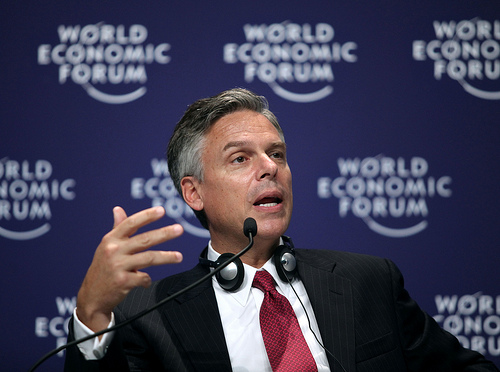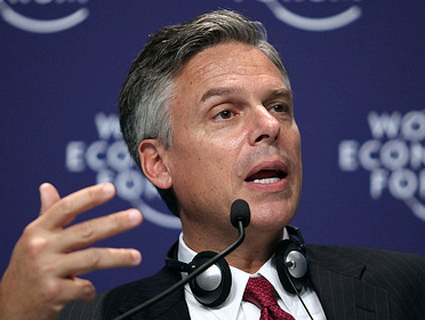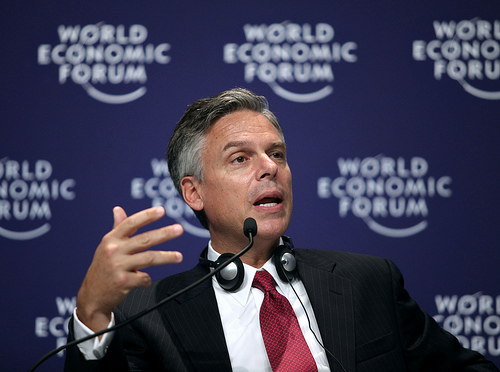Is speaking Chinese on the campaign trail a plus? Former Utah governor, ex-ambassador to China, and current GOP presidential hopeful Jon Huntsman is about to find out. On Friday, Huntsman appeared before a national audience of evangelical activists convened by former Christian Coalition head Ralph Reed. Introducing Huntsman, Reed ran through the candidate’s resume, which included long stints of living abroad, both in Taiwan and later in China as President Obama’s ambassador. He noted that Huntsman speaks fluent Mandarin, but promised his speech would definitely be in English.
Huntsman had other plans apparently, launching into his speech with a demonstration of his Chinese fluency. As his first introduction to the foot soldiers of the Republican Party, it didn’t go over very well. As languages go, Chinese is not the most elegant to the English-speaking ear, and it seemed to be especially jarring to the nearly all-white crowd of evangelicals, who listened with shock. You could almost see the elderly Christians from Wisconsin thinking “Manchurian Candidate.”
Huntsman’s Chinese-speaking on the stump might be even worse for his prospects than John Kerry speaking French in 2004. Americans think even less of the Chinese than they do of the French, and more importantly, they view China as a serious threat to American prosperity, unlike those lazy French people who have a protest every time someone suggests they work past 50. Polls going back decades show that many Americans, especially Republicans, take a dim view of the Chinese, a phenomenon that some researchers attribute to 19th Century anti-Chinese immigration laws. In 1999, a survey conducted by the Anti-Defamation League found that 34 percent of those who responded admitted they wouldn’t want to see a Chinese-American person elected president, a figure the group had never encountered in similar surveys of attitudes towards blacks or Jews.
Americans really don’t like the country of China, either, which they view as a currency-manipulating thief of good American jobs. A January Pew survey found that 36 percent of Americans had an unfavorable view of China, and the percentage of Americans who see China as the country posing the greatest threat to the US nearly doubled over the past two years, eclipsing North Korea, Iran, and Afghanistan. Views of China are even bleaker among Republicans, especially those who are tea party sympathizers. More than 70 percent of Republicans Pew surveyed believed that China is an adversary or a serious problem for the US.
Huntsman’s Chinese connection clearly triggered many of these feelings among the members of the religious right listening to his speech Friday in DC. The candidate earned some polite applause when he spoke about adopting children from China. But the more Huntsman talked about his life in China, the more it sounded like he’d been fraternizing with the enemy—and doing so on behalf of the Obama administration, a role that many GOP voters believe makes him an honorary Democrat. Huntsman’s global perspective and linguistic abilities might have endeared him to some Wall Street Democrats, but after Friday’s performance, it was hard to imagine that the governor-turned-ambassador was going to win over a lot of Iowa GOP caucus goers by showing up at their barbecues and exclaiming, “Ni hao ma?”
















